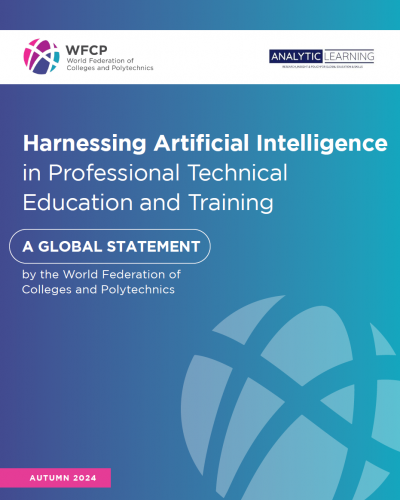Global Statement on Artificial Intelligence
Background and Purpose
As our understanding of Artificial Intelligence (AI) continues to evolve, so does the realm of research. In this Statement, we delve into the impact, applications and implications of AI for labour markets and for professional technical education and training (PTET) Institutions.
AI transcends disciplinary boundaries and redefines possibilities. It is also transforming the field of PTET. WFCP recognises that AI is disruptive to the fundamental way in which PTET institutions function. In this regard, it is important to understand how AI can support PTET with learning and teaching strategies, as well as with administrative processes in
education. Some of its opportunities include automated assessment processes, virtual and immersive reality, personalised learning experiences and personal tutoring.
It is also important to gauge the use and potential of AI across the world, and to rectify disparities in access. As innovative as AI is, it also has certain risks around data, cybersecurity, algorithmic bias, privacy and learner safety and wellbeing which leaders and stakeholders in the PTET industry should be aware of.
The purpose of this Global Statement is to add to the evidence base for PTET at a time of a growing global demand for skills. It highlights some of the key trends, opportunities and risks of AI, and provides some recommendations around these risks. The research is
aimed at policy makers, practitioners and PTET Administrators and Educators.
This statement identifies the opportunities for AI to enhance learning, teaching and equity of access. It also includes a general overview of the current utilisation of AI in the PTET sector, and an estimation of its future utility and developments. It also reviews case studies, insights into future developments and AI tools such as generative AI. Furthermore, it provides recommendations for an ethics framework around the use of AI and potential risks which touch on assessment, malpractice, data ownership, as well as the mitigation of an increase in digital poverty across the globe.
This statement is representative of the WFCP and all its members, and seeks to have application at international, national and local levels. It casts a forward-looking perspective and is an exploration of how AI is expected to impact PTET and the workforce of the future.
Dawn Ward CBE DL
Chair, WFCP
